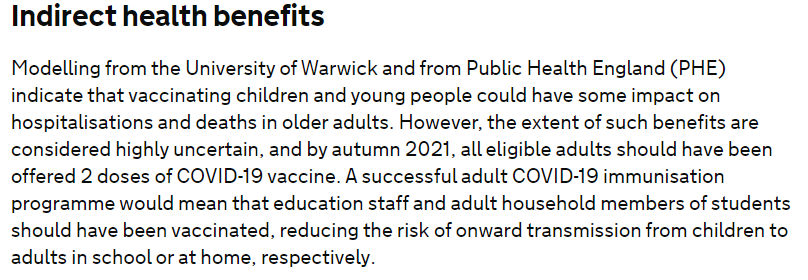
They dismiss PIMS-TS/MIS-C as uncommon and not proven to be caused by Covid-19. (I am comfortable with this.)
7/
7/

They then, similarly, dismiss "Long Covid" in children. Given (the clue's in the name) that it will take time for sequelae, and their duration, to become apparent; and the increasing evidence base on this, this seems an extremely brave decision (as Sir Humphrey would say).
8/
8/

They then briefly mention "indirect health benefits" (not infecting your parents and becoming an orphan etc) and dismiss them as not significant.
Another very brave decision. Where is the modelling?
9/
Another very brave decision. Where is the modelling?
9/

Modelling assumptions would have to include the risk of vaccinated people being seriously ill (it's not negligible); the diminution in risk of transmission by somebody who's had 1 or 2 doses of vaccine (and the times after the doses)
10/
10/
I really want to see their predictions for the number of cases, hospitalisations and deaths in the broader population, particularly in children's parents and grandparents.
I'd love to believe their judgement here isn't complacent. I fear it may be.
11/
I'd love to believe their judgement here isn't complacent. I fear it may be.
11/
I anticipate more data and modelling will emerge over the next few weeks. I fear that it will show, clearly, that the indirect protections are very valuable, making this recommendation and its reasoning seem very feeble, at least in retrospect.
12/
12/
They should have made a decision on the balance of risks; but they appear to have systematically failed to weigh the evidence in support of vaccination appropriately; and they may also have given excessive weight to the risks.
13/
13/
They then move on to "wider…considerations", and suggest that a Covid-19 vaccination campaign might disrupt other important vaccination campaigns - including flu vaccination (which is less serious than Covid-19, and can more easily be prevented by mask-wearing etc.
14/
14/

I'm not convinced I buy this at all.
Generally, vaccination programmes enhance people's willingness to be vaccinated - including against other conditions. And attending for an appointment for one jab is an opportunity to give another "while you're here".
15/
Generally, vaccination programmes enhance people's willingness to be vaccinated - including against other conditions. And attending for an appointment for one jab is an opportunity to give another "while you're here".
15/
I'm afraid, this feels more like "another pretext" for their decision, not a genuine reason.
16/
16/
They then consider "non-health benefits" - and focus on loss of schooling. They seem to suggest that policies designed to reduce transmission in schools will be changed to allow more transmission in exchange for less disruptive isolation of contacts.
17/
17/

Such policy changes will, of course, increase transmission - more children will be infected (and as they're not vaccinated, they'll still continue to be admitted to hospital and die at the current, albeit low rates). And more parents and other contacts will, too.
18/
18/
But they may be right that such policy changes - however advisable or otherwise they may be - will reduce the loss of school for pupils.
Whether this is acceptable - well, you decide.
19/
Whether this is acceptable - well, you decide.
19/
They do, however, say that "Should the government wish to consider vaccination of children and young adults aged less than 18 years with the primary aim of reducing the SARS-CoV2 infection rate (asymptomatic and symptomatic cases)…" a universal vax programme would be best.
20/
20/
Finally, they refer to more trials, and say they'll issue more advice as results emerge.
From the context (previous section on choice of vaccines) it might refer only to decisions if other vaccines are licensed (or, strictly, get emergency use authorisation).
21/
From the context (previous section on choice of vaccines) it might refer only to decisions if other vaccines are licensed (or, strictly, get emergency use authorisation).
21/

I hope and suspect, however, that they will update their recommendations as new evidence emerges. They have dismissed data on Long Covid and on indirect benefits as not strong enough.
Further evidence will emerge, and may force them to recommend universal vaccination.
22/
Further evidence will emerge, and may force them to recommend universal vaccination.
22/
I think it's only a matter of time before we introduce universal vaccination of 5-17 year olds, and that JCVI's caution (overcaution IMO) in recommending this at this time will cause a lot of avoidable harm.
23/23
23/23
@threadreaderapp unroll
@threadreaderapp unroll
• • •
Missing some Tweet in this thread? You can try to
force a refresh







